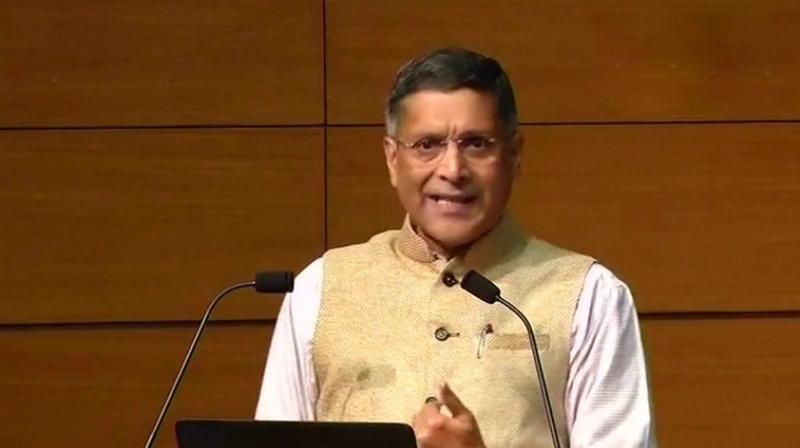All we have to bank on: Arvind Subramanian
This view, has admittedly fetched him some social media pushback.

Bengaluru: The anticipation of interacting with the Chief Economic Advisor had the normally mellow Bangalore International Center packed to the rafters, heavy rain and traffic jams notwithstanding! CEA Arvind Subramanian, who was in conversation with Nandan Nilekani, drew such large crowds that organisers opened up an additional section, where the talk was streamed live! From “surveys that should read like op-ed pieces,” to nifty acronyms, literary allusions and recognising the need to bring new blood into the bureaucracy, Subramanian has steered the nation's economy through some of its most trying times, demonetisation and GST included, with inimitable flair.
At the Bangalore International Center, he took on a banking system in crisis, and the need to look at more privatisation in banking, despite the 'stigmatisation' of the private sector. "I have always thought of banking not as a problem but as a twin challenge," said Subramanian. These are non-performing assets and high corporate debt, the solution for which lies in what the CEA calls the Four Rs: Recognition (how much "bad stuff" exists in the sytem), Retribution, Recapitalisation and Reform. Much has been done on the first three counts, he explains: “The bankruptcy code enacted by the government is a major reform. We have a legal framework for sorting things out.” The government has also allocated 1.3 percent of the GDP to revitalise state banks.
PRIVATISATION
"I have sympathy for the view that public sector ownership complicates regulation, it' s a ménage a trois," Subramanian explained. The lines of accountability are blurred, the consequences of which are being played out now. The long-term solution, he believes, lies in the privatisation of the banking system.
This view, has admittedly fetched him some social media pushback. “Bold, honest, decision-making is impeded because the call of uncertainty blunts the process for the public sector.” It also does away with a level playing field and talent is harder to attack, compromising decision-making and risk-management. Historically, however, the story runs rather differently and Subramanian is the first to concede: "In the boom period, growth was financed by public sector banks, so it's natural for people to believe more in their potential. However, when things go bad, the exit from public to private lending has proved fiendishly difficult. I'm not calling for wholesale privatisation but we do need a stronger private presence and more regulations that are conducive to this."
Stigmatised Capitalism
Born as it was during an era of what Subramanian calls "crony socialism," it's not altogether too hard to understand why the private sector has a bad name. "We had a couple of entrepreneurs who succeeded with government favours." The only time capitalism received a good name, he says, "was when Nandan and his buddies in the IT sector said we can conquer the world!"
COOPERATIVE FEDERALISM
"It's been a wonderful development in so many ways," he says. It's a big leap also in that India has showed that cooperative federalism can actually work." In the West, with more nations willing to relinquish or pool in their sovereignty, there is hope, although more nations are retreating to the safety of the sate. "It shows the ability of the states to rise above narrow interests. The cooperative federalism model is a technology of reform.
How far can the private sector go, when businesses that depend on the government as buyer, seller or regulator faces problems, asked Nilekani. "The longer regulatory capacities seem inadequate, the less faith people will have in the private sector," Subramanian said in response. "You don't think our regulators are good enough," Nilekani retorted, to a burst of laughter. "It's a work in progress," says Subramanian.
Professor Rajeev Gowda, who was in the audience, pointed out the political disagreements that followed demonetisation and GST. "Toxic question!" Subramanian laughed, saying, "The inclusion of political criterion is really something we need to think about. All political unions require a broad consensus on what kind of fiscal unions we need."

